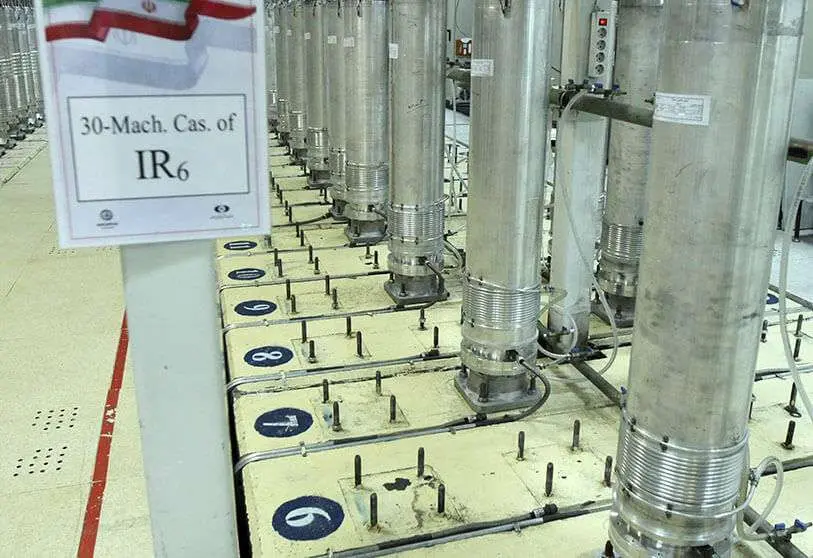Iran's stockpile of enriched uranium exceeds the limits of the nuclear deal 18 times

The International Atomic Energy Agency (IAEA), linked to the United Nations (UN), has published a report in which it has pointed out that the Islamic Republic of Iran has exceeded on more than 18 occasions the limits of enriched uranium reserves reflected in the nuclear pact sealed in 2015 with the United States and other international powers such as Germany, France, the United Kingdom, China and Russia.
The IAEA stated in this latest report that in mid-May "Iran's total enriched stockpile was 3,809.3 kilograms". Precisely, the limit that had been established in 2015 for the storage of enriched uranium was 300 kilograms of a specific compound, the equivalent of 202.8 kilograms of uranium in particular.
The report also noted that Iran continues to enrich uranium to levels above the 3.67% limit reflected in the agreement.
The stockpile of uranium enriched to 20% is now estimated at 238.4 kg, an increase of 56.3 kg since the last report in March, while the amount enriched to 60% stands at 43.1 kg, an increase of 9.9 kg. Enrichment to around 90% is precisely what is required for use as a nuclear weapon, while Iran has always maintained that its nuclear programme is peaceful and for civilian, not military use.

The Joint Comprehensive Plan of Action (JCPOA) was the agreement established seven years ago to limit Iran's atomic development with the aim of preventing the weaponisation of its nuclear programme in exchange for political and economic benefits. The US government of Donald Trump pulled out of the pact in 2018, alleging non-compliance by the Persian country in matters such as uranium enrichment, and imposed harsh economic sanctions, including those related to the oil trade, the main source of financing for the Asian country.
The regime of the ayatollahs responded to this by threatening more severe breaches of the limits of its atomic programme and blocking the Strait of Hormuz, one of the world's main commercial transit routes for crude oil; something that coincided with incidents involving cargo ships from different countries that caused tensions with different affected countries such as Japan and even the United Arab Emirates.
After these tense situations, talks to restore the agreement were recently resumed, with good intentions on the part of the European countries involved in the JCPOA, although the United States has continued to maintain its reservations about Iran's intentions, even under the new US administration of Joe Biden.

According to diplomatic sources consulted by Arab News, the amount of uranium enriched to 60% is a "significant quantity" above which "the possibility of manufacturing a nuclear weapon cannot be excluded", as the IAEA has also explained.
In another report, the IAEA noted that it had not yet obtained clear answers to some unregistered nuclear material at different sites such as Marivan, Varamin and Turquzabad.
The report explains that Iran made the excuse that such material was detected there as a result of an "act of sabotage by a third party involved to contaminate" the sites, but added that no evidence was provided to prove that this was true. The diplomatic source consulted by Arab News indicated that an act of sabotage was "not easy to believe" given "the distribution of the material" that had raised IAEA concerns.
For its part, Iran described as "destructive" the IAEA report that it continues to enrich uranium to a level close to the level needed to make atomic weapons and said it would not share information to clarify the material found in three undeclared nuclear facilities until a new agreement is reached with Western countries involved in the nuclear deal.

"The Islamic Republic of Iran considers this approach destructive to the close relationship and cooperation between Iran and the IAEA," Iran's representative to the UN atomic agency, Mohammed Reza Ghaebi, was quoted as saying by EFE news agency.
"The IAEA must realise the ruinous consequences of publishing such a unilateral report," Ghaebi said, according to Persian media reports.
Iranian foreign ministry spokesman Said Khatibzade also described the report as "unfair" and pointed to alleged pressure from Israel as the cause, as reported by the EFE news agency.
Mohammed Reza Ghaebi himself indicated that the IAEA will not have access to inspections of sites suspected of storing nuclear material to be investigated until an agreement is reached to restore the JCPOA, talks on which have been at a standstill since March. One of Iran's demands for a return to the nuclear agreement is that the United States lift certain economic or political sanctions, such as those affecting the Quds Forces, an elite group of Iran's Revolutionary Guard, something the US giant is not willing to do.









